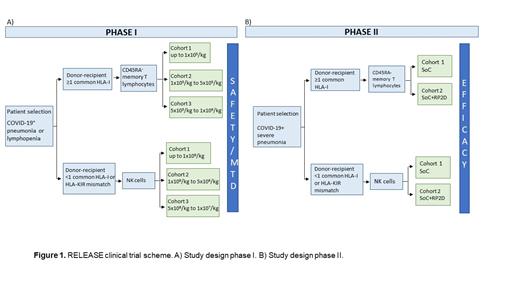Abstract
Background:
Adoptive cell immunotherapies for opportunistic virus in immunocompromised patients using haploidentical memory T cells have shown to be safe and effective. Since severe cases of COVID-19 present a dysregulated immune system with T cell lymphopenia and a hyper-inflammatory state we have proposed that a similar strategy could be proven to be efficient for COVID-19 patients.
This is a study protocol of an open-label, multicenter, double-arm, randomized, dose-finding phase I/II clinical trial to evaluate the feasibility, safety, tolerability, and efficacy of the administration of a single dose of allogenic SARS-CoV-2 specific memory CD45RA - T cells and Natural Killer (NK) cells in COVID-19 patients with lymphopenia and pneumonia. The aim of the study is to find efficient treatments for patients with moderate/severe COVID-19.
Identification of Specific memory T cells and NK cells:
i)Memory T Cells: we first determined the existence of SARS-CoV-2 specific T cells within the CD45RA - T memory cells of the blood of convalescent donors. Memory T cells can respond quickly to the infection and provide long-term immune protection to reduce the severity of the COVID-19 symptoms without inducing classically T cell alloreactivity. Also, CD45RA - memory T cells confer protection for other pathogens the donors encountered in their life.
ii)NK cells: we determined the phenotype of NK cells after COVID-19 and the main characteristic of SARS-CoV-2 specific NK population in the blood of convalescent donors, as it has been shown for cytomegalovirus infections. Also, NK cells confer protection for other pathogens the donors encountered in their life.
Pilot Phase I- Safety, feasibility, and dose escalation:
Between September and November 2020 a phase 1, dose-escalation, single-center clinical trial was conducted to evaluate the safety and feasibility of the infusion of CD45RA - memory T cells containing SARS-CoV-2 specific T cells as adoptive cell therapy against moderate/severe cases of COVID-19. Nine participants with pneumonia and/or lymphopenia and with at least one human leukocyte antigen (HLA) match with the donor were infused. The first three subjects received the lowest dose (1x10 5 cells/kg), the next three received the intermediate dose (5x10 5 cells/kg) and the last three received the highest dose (1x10 6 cells/kg) of CD45RA - memory T cells. Clinicaltrials.gov registration: NCT04578210. Findings: All participants' clinical status measured by National Early Warning Score (NEWS) and 7-category point ordinal scales showed improvement six days after infusion. No serious adverse events were reported. Inflammatory parameters were stabilized post-infusion and the participants showed lymphocyte recovery two weeks after the procedure. Donor microchimerism was observed at least for three weeks after infusion in all patients. Interpretation: This study provides preliminary evidence supporting the idea that treatment of COVID-19 patients with moderate/severe symptoms using convalescent SARS-CoV-2 specific CD45RA - memory T cells is feasible and safe. We did not find dose-liming toxicity. The Recommended Phase 2 dose was 1x10 6 CD45RA - T cells.
Phase II- Efficacy:
Between January 2021 and July 2021 patients have been enrolled based on the matched with the HLA genotype of the convalescent donors and following the protocol inclusion/exclusion criteria. The primary outcome is the incidence of patient recovery at day 14, defined as normalization of fever and oxygen saturation or lymphopenia recovery. Secondary outcomes are the time to normal level of lymphocytes, the proportion of patients showing clinical improvement at day 7, time to first negative SARS-CoV-2 PCR, the incidence of treatment-related adverse events, duration of hospitalization, time to discharge, time to improvement by one category a 7-point ordinal scale or NEWS score, the proportion of patients requiring intensive care unit, and all-cause mortality. In addition, lymphocyte recovery by multiparametric flow cytometry and donor chimerism by real-time PCR in the experimental arm was monitored weekly during the first month.
This study provides preliminary evidence supporting the idea that treatment of COVID-19 patients with moderate/severe symptoms using convalescent CD45RA - memory T cells is safe and feasible. The phase II clinical trial is ongoing to demonstrate efficacy.
Soria: Celgene: Other: Fees; Gilead: Other: Fees; AbbVie: Other: Fees.


This feature is available to Subscribers Only
Sign In or Create an Account Close Modal